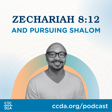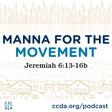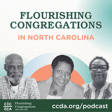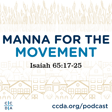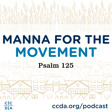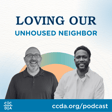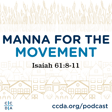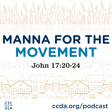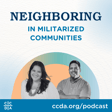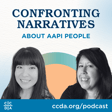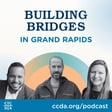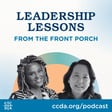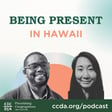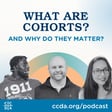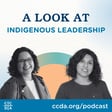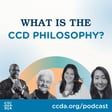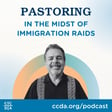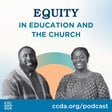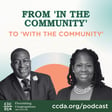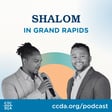Become a Creator today!Start creating today - Share your story with the world!
Start for free
00:00:00
00:00:01

Cultivating Healing Spaces: Strategies For Wholeness And Wellbeing On A Community-Level
In this episode, Dayna Carr teaches us about Cultivating Healing Spaces: Strategies For Wholeness And Wellbeing On A Community-Level from the 2019 CCDA National Conference
Recommended
Transcript
The Spectrum of Trauma
00:00:03
Speaker
And we're accepting the fact that trauma is real and that trauma exists on a spectrum.
00:00:08
Speaker
And just because the trauma that somebody comes in with doesn't get listed through the American Psychological Association doesn't mean that it's not valid.
Introduction to Healing Spaces Workshop
00:00:19
Speaker
In this episode, Dana Carr teaches us about cultivating healing spaces, strategies for wholeness and well-being on a community level.
00:00:27
Speaker
Taken from the 2019 CCDA National Conference, we now join her workshop in session.
00:00:35
Speaker
My name is Dana.
00:00:36
Speaker
I'm thrilled that you all are here today and thrilled that you all were so early and on time.
00:00:42
Speaker
So we're going to press through several things today.
00:00:46
Speaker
And hopefully this will be a great discussion for all of us.
00:00:49
Speaker
We have so many people.
00:00:50
Speaker
Some of you guys who are sound sensitive realize just how many people we are because that was a very loud five minutes.
00:00:55
Speaker
I'm sorry.
00:00:57
Speaker
It's going to be hard for us to have a whole lot of discussion during this time because it just will get overwhelming.
00:01:03
Speaker
But we'll have some time at the end for questions and maybe some time for you to whisper comments if you really feel like you need to get something out.
00:01:10
Speaker
So one thing I want to tell you is a housekeeping item before we get started.
00:01:13
Speaker
Please do fill out the CCDA survey.
00:01:16
Speaker
Also, I will send, that's right, and she has more if you need one.
00:01:20
Speaker
I also have some small ones and here's the caveat.
00:01:24
Speaker
Okay, there are three little questions.
00:01:26
Speaker
One, you write a number.
00:01:27
Speaker
One, you write the most helpful part of the, yeah, the number is a ranking, right?
00:01:32
Speaker
One is this was terrible.
00:01:33
Speaker
Ten is it was great.
00:01:35
Speaker
The next, the most helpful part of the workshop, it could be two words, okay?
00:01:39
Speaker
And then the last thing is what you wish it would have covered or explained more thoroughly.
00:01:44
Speaker
If you fill this out, one, you will make me very happy and it's an easy way to show your appreciation for this time.
00:01:50
Speaker
But two, I'll send you the slides, okay?
00:01:52
Speaker
So you don't have to worry about taking pictures.
00:01:54
Speaker
You don't have to worry about all that.
00:01:55
Speaker
I will send you the slides and I'll send you some extra just resources and links and places you can go.
00:02:03
Speaker
If you don't fill this out, I'm not sending you anything, okay?
00:02:06
Speaker
If you write your email on it and you don't answer the other questions, I might send you the info, but also I'm not going to be smiling while I do it.
00:02:14
Speaker
So just do me a favor because it'll take you two minutes, okay, and do this for me.
00:02:19
Speaker
Towards the end, yeah, I'll get a couple of volunteers.
00:02:22
Speaker
Since we don't have an official volunteer, you guys can all volunteer.
00:02:25
Speaker
Okay, so are we ready to go?
00:02:28
Speaker
We're ready.
00:02:28
Speaker
Okay.
Workshop Framework: Trauma, ACEs, and Community
00:02:29
Speaker
So there's three main parts we're going to cover today.
00:02:31
Speaker
We're going to look a little bit about trauma, stress, ACEs.
00:02:35
Speaker
Are some of you guys familiar with ACEs?
00:02:38
Speaker
Yes.
00:02:38
Speaker
Okay.
00:02:38
Speaker
So we're going to chat about it a little bit.
00:02:40
Speaker
A lot of this stuff is very available online once you realize what it is.
00:02:44
Speaker
Okay.
00:02:45
Speaker
So we're going to talk about those things a bit to frame us out.
00:02:49
Speaker
We're going to pause for a minute there in the middle as that settles to talk about scripture for a couple of minutes because we need to stay rooted in that.
00:02:56
Speaker
And then we're going to move into trauma-informed community building strategies, right?
00:03:01
Speaker
So we hear a lot about trauma-informed education, trauma-informed healthcare.
00:03:06
Speaker
We don't always hear a lot about grassroots level ways to be trauma-informed and how to integrate that work.
00:03:13
Speaker
So that's where we're going to spend the bulk of our time at the end and hopefully have some time to talk about our own context and how we can make that happen.
00:03:20
Speaker
Okay.
00:03:21
Speaker
Okay.
Dana's Personal Journey and Community Impact
00:03:22
Speaker
Um, so my name is Dana.
00:03:24
Speaker
I already told you that I live in Greensboro, North Carolina.
00:03:27
Speaker
I've been doing community development in a neighborhood for 15 years.
00:03:31
Speaker
Um, I grew up in rural poverty.
00:03:33
Speaker
So in the backwoods of Florida, if anybody's familiar with Panama city area, um, that is where I grew up.
00:03:39
Speaker
My family just lost all of their homes in hurricane Michael, um, and are still bouncing back.
00:03:44
Speaker
I think yesterday was the one year anniversary.
00:03:46
Speaker
And so, um,
00:03:47
Speaker
Rural poverty, I know most folks at CCDA tend to work with city poverty, but rural is a real, it's the same thing, a little different, right?
00:03:57
Speaker
Fewer resources, all the same place.
00:04:01
Speaker
So my whole life really has been immersed in communities of poverty with the exception of a very few years.
00:04:09
Speaker
And so a lot of this comes out of my own story and my family's own story, right?
00:04:13
Speaker
That's the driving force, but then also what I've continued to experience now.
00:04:17
Speaker
So the neighborhood I'm in is a neighborhood of about 2000 folks close to downtown Greensboro.
00:04:23
Speaker
It's one of the most diverse communities in the city.
00:04:26
Speaker
And it is quickly gentrifying because the university is buying up our neighborhood.
00:04:31
Speaker
And so rents are skyrocketing and it's a it's a tricky time.
00:04:35
Speaker
So and I know some of you all understand that, too.
00:04:39
Speaker
So my interest in this topic really came in part the first time I bumped into ACEs, which we'll talk about if you're not familiar.
00:04:47
Speaker
It's the Adverse Childhood Experiences Survey.
00:04:51
Speaker
It was really disrupting to me to discover how high my own ACE score was.
00:04:56
Speaker
Right.
00:04:57
Speaker
And it's like, OK, I'm doing all right.
00:04:58
Speaker
Right.
00:04:59
Speaker
There's some some good feelings of that.
00:05:01
Speaker
But also you realize just how all the nuances of everything wrapped up in that.
00:05:06
Speaker
Right.
00:05:07
Speaker
And so really just had wanted to learn more and more and more and dig into that.
00:05:13
Speaker
The other piece is that through the years of community ministry, I'm sure we can all think in our own context of people that we look back and say, man, they have it, right?
00:05:22
Speaker
It's one of the smartest kids I've ever met, right?
00:05:24
Speaker
Gets along with everybody, has a good head on their shoulders, and then they totally tank at some point, right?
00:05:30
Speaker
Or adults that we meet, right?
00:05:32
Speaker
Some of my homeless friends, man, they're some of the most brilliant people I know, right?
00:05:37
Speaker
It's like, how did this happen?
00:05:39
Speaker
And I think a lot of times, right, there's this unresolved trauma.
00:05:43
Speaker
There's ongoing life stress.
00:05:44
Speaker
There's all these things that are happening that a lot of folks will say, well, they just need to get it together, right?
00:05:50
Speaker
Like you just have to keep moving forward, but we have to deal with the root issues, right?
00:05:55
Speaker
And so that's really where the heart of this work comes from is pressing into that.
00:05:59
Speaker
And so recognizing that when people have deep trauma, right?
00:06:03
Speaker
You need individual approaches to that, right?
00:06:07
Speaker
Like I went through a lot of years of counseling.
00:06:09
Speaker
I recommend most people I meet go to lots of years of counseling to get some things worked out.
00:06:14
Speaker
But we also, as CCDA folks, right, we recognize the inherent dignity, the humanity, the imago Dei of the individual, but we also recognize the power of the systemic, right?
00:06:27
Speaker
And that we have to hit things on a system level if we're going to see change.
00:06:31
Speaker
And so you have to have both hands.
00:06:34
Speaker
You have to have individual relationships.
00:06:36
Speaker
You also have to have system level approaches.
00:06:39
Speaker
And so as I've entered into this work, that's really been the question.
How Can Communities Become Healing Spaces?
00:06:43
Speaker
Is how do we help our neighborhoods, our communities, whatever your context is, how do we help our organizations become a space that actually encourages healing in the individual?
00:06:53
Speaker
Right.
00:06:54
Speaker
Right.
00:06:55
Speaker
So it's not so much.
00:06:55
Speaker
Let's set up a yoga program and hope that people will come and find healing.
00:06:59
Speaker
That's a good thing.
00:07:00
Speaker
Right.
00:07:01
Speaker
But how does the space of the community become a healing space?
00:07:06
Speaker
And so that's some of what what we're going to press into.
00:07:09
Speaker
So we're going to start a little bit with with ACEs, trauma, stress, a little bit of discussion around this.
00:07:15
Speaker
We have 75 minutes together, which is a tiny amount of time.
00:07:19
Speaker
So you're going to identify things that you think, man, she left this out and oh, she should have talked about that.
00:07:24
Speaker
We have 75 minutes, friends.
00:07:25
Speaker
OK, so make note of those things and add it on your little sheet.
00:07:30
Speaker
So the ACES survey, if you're not familiar, it breaks, it's a list of 10 indicators that identifies childhood adversity broken into a few major categories.
00:07:41
Speaker
So it looks at abuse.
00:07:43
Speaker
It looks at neglect.
00:07:44
Speaker
It looks at household dysfunction.
00:07:46
Speaker
Now, if you see those things, so physical abuse, emotional abuse, sexual abuse, physical neglect, emotional neglect, mental illness, mothers who were treated violently, divorce, substance abuse, having a relative who's incarcerated, those are all big things that disrupt the lives of a child.
00:08:06
Speaker
Can you think of some things that are missing?
00:08:09
Speaker
You could just holler.
00:08:10
Speaker
What's a couple?
00:08:12
Speaker
Okay, health.
00:08:13
Speaker
Uh-huh.
00:08:13
Speaker
What else?
00:08:16
Speaker
Okay.
00:08:16
Speaker
Yep.
00:08:17
Speaker
So yeah, when parents don't have a job, what else?
00:08:22
Speaker
Okay.
00:08:22
Speaker
Foster care.
00:08:23
Speaker
That's right.
00:08:25
Speaker
Community violence.
00:08:28
Speaker
Okay.
00:08:28
Speaker
Food insecurity.
00:08:29
Speaker
Yep.
00:08:30
Speaker
So there's so many things, right?
00:08:33
Speaker
The ACEs survey and the ACEs study really was a groundbreaking study because nothing of this scope had ever been done before.
00:08:41
Speaker
So it was a few doctors out of Kaiser Permanente who led the study.
00:08:45
Speaker
They had a sample size of 17,000 people.
00:08:49
Speaker
Okay, that's huge for this kind of work.
00:08:51
Speaker
And so when you do community work, you know that these things impact people, right?
00:08:56
Speaker
And we can see the impact, but sometimes we need some data to back that up.
00:09:00
Speaker
And that's what this study did.
00:09:02
Speaker
Okay, so they did the surveys, they tracked it.
00:09:07
Speaker
This was some of the prevalence.
00:09:08
Speaker
So the prevalence that came out of it, 26 percent of those 17,000 people had one ACE indicator.
00:09:15
Speaker
Right.
00:09:16
Speaker
The easiest one, I would say easy is a bad word, but probably one of the more prevalent is maybe they had divorced parents.
00:09:21
Speaker
Right.
00:09:22
Speaker
When you look at our nation's divorce rate.
00:09:25
Speaker
Um, 16% had two ACEs, nine and a half percent had three ACEs, 12 and a quarter or 12 and a half percent had four ACEs or more.
00:09:33
Speaker
Uh, there's a good chunk that have none, right?
00:09:35
Speaker
About a third of the sample size had none at all.
00:09:39
Speaker
Okay.
00:09:39
Speaker
But when we look at our communities, a struggle, some of those, some of those folks might only have one or two.
00:09:45
Speaker
I think the prevalence tends to be a whole lot higher, right?
00:09:50
Speaker
Um, yeah.
00:09:51
Speaker
So general estimates, about 28% of folks, physical abuse was the one that they experienced.
00:09:58
Speaker
Emotional neglect, household substance abuse, a lot of these things tend to be coinciding issues, right?
00:10:07
Speaker
So anyways,
ACEs Study and Health Connections
00:10:08
Speaker
a lot of prevalence, but here's the big, this is the more exciting part that came out of it, is that they were able to establish a direct link to health outcomes to say the higher a person's ACE score, the worse their health is in the long term.
00:10:22
Speaker
And so if you look at the pyramid, that's from the study, right?
00:10:25
Speaker
It starts a baseline of you experience adversity in childhood.
00:10:29
Speaker
Next, you see impairment in social, emotional, and cognitive development.
00:10:33
Speaker
Do we see that in some of our kids and adults that we work with?
00:10:37
Speaker
Right.
00:10:37
Speaker
And then the next step is adoption of health risk behaviors.
00:10:41
Speaker
So you've got a high schooler who starts smoking weed consistently.
00:10:45
Speaker
Right.
00:10:47
Speaker
Part of that probably comes back here.
00:10:49
Speaker
Right.
00:10:52
Speaker
Disease, disability and social problems comes next and early death at the end.
00:10:56
Speaker
Is this prescriptive?
00:10:57
Speaker
Does it happen to every person who experiences a high number of ACEs?
00:11:01
Speaker
Not at all.
00:11:02
Speaker
But it does help develop some understanding.
00:11:04
Speaker
Right.
00:11:05
Speaker
And so some of the behavioral things, lack of physical activity, there are links to obesity, right?
00:11:11
Speaker
And to excessive weight that goes back to adverse childhood experiences.
00:11:15
Speaker
Can we think of people that we know that to be true?
00:11:19
Speaker
Here's some data to back it up, right?
00:11:22
Speaker
Smoking, alcoholism, when you go physical and mental health, depression, that feels like an obvious one to me, right?
00:11:29
Speaker
Like, of course, if you have a really rough childhood, you're going to be prone to depression.
00:11:34
Speaker
But it is helpful to have it documented.
00:11:37
Speaker
Broken bones, that's an interesting one, I think.
00:11:40
Speaker
There's a higher co-occurrence of that with folks who have high levels of ACEs.
00:11:47
Speaker
So there is a lot of national data that is very widely available.
00:11:52
Speaker
There's a lot of folks have really been pressing into this.
00:11:56
Speaker
I think it's helpful to an extent, but also as practitioners, we don't have the time to get lost in just the research forever.
00:12:04
Speaker
Right.
00:12:04
Speaker
The research is fun, but we need to make practical things out of it.
00:12:09
Speaker
Now, the next thing I want to talk about briefly is we listed a bunch of things that weren't on here, right?
00:12:15
Speaker
And so the validation in that, there's a guy, Robert Scare, who wrote a book called The Trauma Spectrum.
00:12:21
Speaker
And so he talks about trauma as a spectrum.
00:12:24
Speaker
And so where the ACEs study identified very specific things, and there are other traumas that people certainly would recognize, he really proposes a broad spectrum and includes what he calls negative life experiences.
00:12:39
Speaker
I really like his definition.
00:12:41
Speaker
So he starts with catastrophic events, which could be things like experiencing war, experiencing extreme violence.
00:12:49
Speaker
Those impact a person, right?
00:12:51
Speaker
And then on the other end of the spectrum, he lists little traumas.
00:12:55
Speaker
And some of his little traumas I don't feel like are that little, but that's fair.
00:12:59
Speaker
So childhood neglect.
00:13:00
Speaker
Oh, that's a small thing, right?
00:13:03
Speaker
Motor vehicle accidents.
00:13:05
Speaker
That can be really traumatic for kids, right?
00:13:08
Speaker
Especially depending on what the rest of their life, what other things they're experiencing.
00:13:13
Speaker
Exposure to violence via media and popular entertainment.
00:13:17
Speaker
That's a big one now, right?
00:13:19
Speaker
Every time that there is an unjust police shooting, those videos play over and over and over and over.
00:13:25
Speaker
And the exposure is helpful because it calls people to accountability.
00:13:29
Speaker
But there's also a level of trauma and re-traumatization that our children of color and adults of color experience over and over and over.
00:13:37
Speaker
Right?
00:13:38
Speaker
And there's certainly folks outside the white folks, I'm sure, experience some level of trauma too, but...
00:13:43
Speaker
Our kids of color don't need to be experiencing it over and over and over, right?
00:13:47
Speaker
And so there's a traumatic experience that comes with that.
00:13:52
Speaker
He lists a few other things.
00:13:53
Speaker
These are not in any certain order, so don't place them on the spectrum.
00:13:56
Speaker
I just dropped them around, okay?
00:13:58
Speaker
Unrecognized societal trauma, personal debt, that can be traumatic.
00:14:04
Speaker
One that I thought was really interesting he talked about was maternal stress, the trauma of maternal stress to in utero fetuses, right?
00:14:12
Speaker
So we're talking about babies still in the womb experiencing trauma because of the stressful lives of their mothers.
00:14:18
Speaker
Okay.
00:14:19
Speaker
The broken healthcare system, the trauma that people who are ill experience with a broken healthcare system.
00:14:26
Speaker
I have a family member right now who has congestive heart failure and has been in and out of the hospital for the last few months straight, and all of her prescriptions are unaffordable, and she's in the donut hole of Medicare, right?
00:14:37
Speaker
So there's nothing.
00:14:39
Speaker
What do you do?
00:14:40
Speaker
That's dramatic.
00:14:43
Speaker
Racial injustice and microaggressions, right?
00:14:46
Speaker
That's...
00:14:48
Speaker
It's there, right?
00:14:49
Speaker
Racial trauma is significant.
00:14:51
Speaker
The chronic absence of family intimacy.
00:14:55
Speaker
So when you're in a family, but you exist together and that's it.
00:15:00
Speaker
Right.
00:15:00
Speaker
And there's not the love and the kindness and the interaction that a healthy family might have.
00:15:05
Speaker
That's traumatic.
00:15:07
Speaker
One of the girls that I think of often, she was one of my first friends in the neighborhood.
00:15:12
Speaker
She just took me under her wing as her little nine year old self and showed me all the ways.
00:15:17
Speaker
She was one of those kids.
00:15:18
Speaker
It was super bright.
00:15:19
Speaker
Right.
00:15:19
Speaker
And that we knew she could easily whatever she wants to do.
00:15:22
Speaker
She could be a doctor.
00:15:23
Speaker
She could go to law school like she's got it.
00:15:26
Speaker
Right.
00:15:26
Speaker
She has friends everywhere, but she knows how to balance those relationships.
00:15:30
Speaker
She doesn't get in trouble, but she could put somebody in their place real quick if she needs to.
00:15:35
Speaker
Right.
00:15:35
Speaker
Like she just had it.
00:15:37
Speaker
And in high school, her mom moved out and moved in with her boyfriend and helped raise his kids and left this young woman and her older brother and younger brother, all high school age, to just live by themselves.
00:15:49
Speaker
Right.
00:15:50
Speaker
And all three of them derailed, right?
00:15:52
Speaker
Like she would pop in once a week and drop off food.
00:15:55
Speaker
But when you have three high schoolers running a household, it's not going to go super well, right?
00:16:01
Speaker
And so she's still just as bright as she ever was.
00:16:03
Speaker
That doesn't change.
00:16:05
Speaker
But her life has taken a very different trajectory and she's still handling her business, right?
00:16:10
Speaker
Like I have no doubt that she's taking care of things, but it's been a much harder road because of what's happened.
00:16:16
Speaker
Right.
00:16:17
Speaker
And so it's important.
00:16:18
Speaker
We all know this, right?
00:16:20
Speaker
Like we know that these things are traumatic.
00:16:23
Speaker
We know that they impact a person, but we do need to sit with it.
00:16:27
Speaker
Right.
00:16:28
Speaker
And we do need to think through as we're planning programs, as we're fundraising for programs, as we're investing in our neighborhood.
00:16:36
Speaker
How do we bring this to light in a way that people are going to see and believe?
00:16:40
Speaker
Right.
00:16:41
Speaker
Right.
00:16:41
Speaker
And so some of that is with anecdotal stories.
00:16:44
Speaker
And then some of it is that we need to validate some data.
00:16:49
Speaker
And so national ACEs data is very widely available.
00:16:53
Speaker
There is not a ton of ACEs data available on the neighborhood level.
00:16:58
Speaker
Right.
00:16:58
Speaker
But the good thing is that there is more and more neighborhood level data coming available every year.
00:17:05
Speaker
So the CDC has the Behavioral Risk Factor Surveillance System data.
00:17:11
Speaker
That is a data set you can easily access online.
00:17:15
Speaker
You can pull it up by census tract, and then you can look at certain indicators.
00:17:20
Speaker
So you can't look at all 10 of the ACEs.
00:17:22
Speaker
You can't necessarily drill down to that, but you can pull up divorce rates.
00:17:27
Speaker
You can pull up the number of people in that census tract who have experienced poor mental health, self-described poor mental health in the last seven days, right?
00:17:37
Speaker
The number of people who have had more than, I think it's more than five poor mental health days in the last month,
00:17:43
Speaker
But as you look through that, there's some really interesting data that you can pull and say, okay, based on this, there's a clear correlation that we can see mental health issues, right?
00:17:53
Speaker
So when one of the ACE questions asked, did you live with a person with severe mental illness or with mental illness?
00:17:59
Speaker
There are some things that we can extrapolate and make connections to,
Data-Driven Community Solutions
00:18:03
Speaker
right?
00:18:03
Speaker
To be able to localize our data.
00:18:05
Speaker
Sometimes you'll find data points that aren't included, right?
00:18:08
Speaker
So in my county, the teen pregnancy rate is 20%.
00:18:12
Speaker
As I was looking around, our neighborhood's teen pregnancy rate is 39%.
00:18:17
Speaker
I was like, holy smokes.
00:18:18
Speaker
One, I feel like I don't see pregnant teenagers very often.
00:18:22
Speaker
So that's a growth edge for us, right?
00:18:24
Speaker
Is where are these girls and how can we get connected and support and love them well?
00:18:29
Speaker
That's not collected here, but as we start to press into the data, that's a traumatic experience, right?
00:18:35
Speaker
And when we look at the little trauma of in utero stress, in utero trauma to mothers who are stressed, a teenage mom who probably is experiencing pressure from her peers, right?
00:18:48
Speaker
And disappointment, maybe her parents or her grandparents are not supportive.
00:18:52
Speaker
She's carrying all kinds of stuff on top of normal teenage hormones, right?
00:18:57
Speaker
Right.
00:18:57
Speaker
Which is traumatic in itself.
00:19:00
Speaker
And so we see spaces where we can where we can enter in the census census data is great.
00:19:06
Speaker
You can really get into a lot of good information there.
00:19:10
Speaker
I tend to prefer in terms of demographics and a few other things, education data.
00:19:16
Speaker
Right.
00:19:16
Speaker
Because we all there's plenty of people who don't respond to the census.
00:19:20
Speaker
Right.
00:19:21
Speaker
But kids in a school absolutely get counted because they turn into dollars for that school.
00:19:27
Speaker
And so demographically in our community, we have barely any Latino children or adults, yet our school system says very differently.
00:19:36
Speaker
Right.
00:19:36
Speaker
And so we know that they're there, but school data answers that question a little bit better for us.
00:19:43
Speaker
The Opportunity Atlas, are you guys familiar with that?
00:19:46
Speaker
Okay, so this is excellent.
00:19:48
Speaker
It just came out about a year ago, within the last year or so.
00:19:52
Speaker
Opportunityinsights.org, I'm pretty sure it's the link.
00:19:56
Speaker
But also, I'll send you that when you fill this out.
00:19:59
Speaker
So...
00:20:00
Speaker
The guy who put this together pulls all of this data.
00:20:03
Speaker
And so you can look up a neighborhood and that's actually where I found the teen pregnancy rate.
00:20:09
Speaker
But what's really cool is he tracks mobility.
00:20:12
Speaker
So you can look at a specific census track and I think it looks at 30 year.
00:20:17
Speaker
It's either 20 or 30 year mobility for kids who were born in a specific neighborhood.
00:20:23
Speaker
Right.
00:20:23
Speaker
So I can look at the area that I grew up and see this percentage of people left the area.
00:20:28
Speaker
This percentage of people stayed there.
00:20:30
Speaker
This percentage ended up graduating college, right?
00:20:33
Speaker
This percentage has a job making between $10,000 and $15,000 a year.
00:20:36
Speaker
This percentage has a job between $50,000 and $75,000.
00:20:41
Speaker
Right.
00:20:42
Speaker
And so you also get some projections there.
00:20:44
Speaker
And so, again, you have some good growth edges on how do we best approach our community?
00:20:50
Speaker
Right.
00:20:50
Speaker
And build it into a place that kids can stay and thrive or that adults can stay and thrive.
00:20:55
Speaker
Hi, I'm Lorenzo.
00:21:00
Speaker
What I love about CCDA is being connected to so many amazing leaders across the country.
00:21:05
Speaker
Welcome to the CCDA podcast.
00:21:10
Speaker
Zip code.
00:21:11
Speaker
So one of the studies that centers around ACEs, the folks made the comment in their report, a child's zip code is more important than his or her genetic code in determining future health and life chances.
00:21:24
Speaker
We see that, right?
00:21:26
Speaker
Depending on what area of town you live in and grew up on,
00:21:32
Speaker
You got all of that.
00:21:33
Speaker
The plenary speaker who talked about the oil drilling in L.A., right?
00:21:38
Speaker
Or she won the award, right?
00:21:40
Speaker
That absolutely shows that, right?
00:21:43
Speaker
When you have higher cancer rates, when you have all the different things.
00:21:47
Speaker
And so we see that in the way that our neighborhoods are developed, right?
00:21:51
Speaker
Place matters, absolutely.
00:21:53
Speaker
So Dr. Charles Bruner did a study called Ace Place Race in Poverty, and it was a census tract analysis of low income census tracts.
00:22:02
Speaker
And so really pressed into what's happening in these different neighborhoods.
00:22:09
Speaker
As a result of his study, his encouragement, because ACEs, I'll say this to you, when we look at ACEs in particular, it tends to be clinical, right?
00:22:17
Speaker
Doctors' offices are using it, large counseling agencies, some of those places look at ACEs and are attacking it from a clinical level, which matters, right?
00:22:29
Speaker
It absolutely matters.
00:22:31
Speaker
My hunch is that the bulk of us in this room are not clinicians, right?
00:22:35
Speaker
Which is why we're looking at some of these other pieces.
00:22:38
Speaker
So he encourages movement from exclusively on individual care, right?
00:22:42
Speaker
You need to go to counseling.
00:22:43
Speaker
You need to go to the doctor.
00:22:45
Speaker
We need to get you plugged in with some individual assistance to a population health perspective.
00:22:51
Speaker
When we start thinking in terms of the population of our whole neighborhood, it shifts the way that we do our work.
00:22:58
Speaker
And so he suggests investing in community building activities, which increases the community's capacity to care for its own residents.
00:23:06
Speaker
When our for our neighborhoods to become healing spaces, that doesn't mean an injection of a ton of outside organizations.
Community Empowerment and Systemic Barriers
00:23:13
Speaker
It means that the community has the ability to heal itself.
00:23:16
Speaker
Right.
00:23:17
Speaker
To care for each other, to step into those places really in the way that we hear that neighborhoods used to be.
00:23:22
Speaker
Right.
00:23:23
Speaker
The old way of loving each other well.
00:23:25
Speaker
Right.
00:23:27
Speaker
Out of his study, so there were four big things that he found that were all going to go, uh-huh, uh-huh, uh-huh.
00:23:33
Speaker
So poor neighborhoods are rich and young children.
00:23:35
Speaker
Uh-huh.
00:23:38
Speaker
Poor neighborhoods are very disproportionately home to children of color.
00:23:42
Speaker
Differences in terms of income, wealth, education, and social structure are profound and require community building as well as individual service attention.
00:23:53
Speaker
And then finally, every state has these disparities, but they do differ in the composition of the neighborhoods, right?
00:24:01
Speaker
And they differ in the types or the variety of children who are most affected, right?
00:24:07
Speaker
So it's a problem everywhere.
00:24:08
Speaker
Whatever state you live in, this is a challenge.
00:24:10
Speaker
It looks a little different, which is why you need to dig into the data for your own community, right?
00:24:16
Speaker
Because your approach is going to look different than the person next to you.
00:24:19
Speaker
It's going to look different than my approach.
00:24:23
Speaker
All right.
00:24:23
Speaker
And then community and trauma.
00:24:25
Speaker
So the Prevention Institute and Kaiser Perm did a pull together another report.
00:24:31
Speaker
And so they talked about trauma can be a barrier to the most successful implementation of healing and well-being strategies, including those to prevent violence.
00:24:41
Speaker
The other thing that I've thought about often in this work is how many really great organizations there are in Greensboro, right?
00:24:48
Speaker
We have some great organizations that do job skill building.
00:24:52
Speaker
We have great organizations that do financial literacy.
00:24:55
Speaker
We have great organizations that work on maternal child health, right?
00:24:58
Speaker
All these things.
00:25:00
Speaker
And yet when you look around, there are people who...
00:25:03
Speaker
they're not even ready to take advantage of those programs, right?
00:25:08
Speaker
Like they're not at a baseline to even start the process of trying to thrive.
00:25:15
Speaker
And I think for the most part, we go, we can't help everybody.
00:25:18
Speaker
And so we just keep moving, right?
00:25:21
Speaker
Which I get, you can't help everybody.
00:25:24
Speaker
We can't, we have to figure out our lane and do the best we can in that.
00:25:29
Speaker
But I always go back to what happens to everybody else?
00:25:34
Speaker
Right.
00:25:34
Speaker
And I think Jesus cares deeply about what happens to everybody else.
00:25:38
Speaker
And so that's where these these deeper roots of how do we help our neighborhoods become healing places matter so much because there's a whole swath of the community who they're never they're never going to make it in a program the way things stand right now.
00:25:55
Speaker
They're just not.
00:25:56
Speaker
And so what do we do for them?
00:25:58
Speaker
Right.
00:25:58
Speaker
How do we love them?
00:25:59
Speaker
Well,
00:26:00
Speaker
And when do we start to figure out how can they love us?
00:26:03
Speaker
Well, right?
00:26:03
Speaker
Like it's a two way street.
00:26:05
Speaker
But how do we press into that?
00:26:08
Speaker
So he identified three focus categories of the symptoms that we see in communities and the responses.
00:26:14
Speaker
And so the sociocultural environment, that's the people, right?
00:26:17
Speaker
People matter.
00:26:19
Speaker
in terms of the neighborhood, the physical and built environment.
00:26:23
Speaker
Built environment is the buildings.
00:26:25
Speaker
It's the condition of the neighborhood.
00:26:27
Speaker
It's the places that exist there, right?
00:26:29
Speaker
So the place matters.
00:26:31
Speaker
And then economic environment.
00:26:32
Speaker
Is there equitable opportunity within that community, that organization, the city, right?
00:26:38
Speaker
So all of those pieces come together.
00:26:43
Speaker
All right, so we're going to pause for a second.
00:26:46
Speaker
This is really where I wanted you to take the deep breath.
00:26:48
Speaker
I just got lost on my slide.
00:26:49
Speaker
So take another deep breath.
00:26:52
Speaker
Okay, stress is heavy, right?
00:26:55
Speaker
And as we think, I always find it helpful to think of a couple people, right?
00:26:59
Speaker
As I think about these things, because it helps root it in my own space.
00:27:04
Speaker
So you may want to think about a couple people or a couple organizations or a couple places where you see these things in play.
00:27:11
Speaker
We're going to go through just a couple things here because I think in the midst of stress, we still want to be and need to be grounded in why we're doing this because it presents the hope that's going to launch us into how we build community in better ways.
Imago Dei and Community Dignity
00:27:27
Speaker
So the idea of Imago Dei is something that I always come back to over and over and over and that we hear over and over in CCDA, right?
00:27:36
Speaker
So Genesis 1, 26 and 27, then God said, let us make mankind in our image, in our likeness, so that they may rule over the fish in the sea and the birds in the sky, over the livestock and all the wild animals, over all the creatures that move along the ground.
00:27:53
Speaker
So God created mankind in his own image.
00:27:56
Speaker
In the image of God, he created them.
00:27:58
Speaker
Male and female, he created them.
00:28:01
Speaker
In John, all things came into being through him, and without him, not one thing came into being.
00:28:09
Speaker
And in Colossians, for in him, all things in heaven and on earth were created, things visible and invisible, whether thrones or dominions or rulers or powers, all things have been created through him and for him.
00:28:25
Speaker
And so we know the basics, right, is that when someone is made in the image of God, they bear that image all the time, right?
00:28:32
Speaker
They can't lose the image.
00:28:34
Speaker
They can't throw the image away.
00:28:36
Speaker
Right.
00:28:37
Speaker
We could choose not to see it and it gets real muddied up sometimes, but it doesn't change the fact that they are an image bearer.
00:28:44
Speaker
Right.
00:28:45
Speaker
They carry the face of the almighty God and that demands respect and honor and love and care.
00:28:53
Speaker
Right.
00:28:53
Speaker
And commitment and all of those things.
00:28:55
Speaker
Right.
00:28:56
Speaker
The other thing that I really love about this idea of being made in the image of God, though, is that God exists in three persons, right?
00:29:05
Speaker
So we have Father, Son, and Holy Spirit, which means inherently, right, God exists in community.
00:29:10
Speaker
And if we're made in his image, we are created for community, right?
00:29:15
Speaker
We are created to be together.
00:29:17
Speaker
We're created to be in relationship.
00:29:20
Speaker
And where we see the breakdown for so many of our friends who are struggling in the community is a breakdown of relationships, right?
00:29:27
Speaker
When you've experienced trauma, trauma isolates on so many levels.
00:29:33
Speaker
Sometimes people isolate you.
00:29:35
Speaker
Sometimes you isolate yourself.
00:29:37
Speaker
Sometimes it's both, right?
00:29:38
Speaker
Right?
00:29:40
Speaker
And so we see this, right?
00:29:42
Speaker
Like we're drawn back when we recognize we're created in the image of God.
00:29:46
Speaker
And even when we don't recognize it, there's that internal longing to be in community with God and with each other.
00:29:55
Speaker
And so we've got to remember that, right?
00:29:56
Speaker
As we're doing the hard work of building community, when people are jerks sometimes, right?
00:30:03
Speaker
That doesn't mean that they're any less worthy of community.
00:30:06
Speaker
It doesn't mean they're any less worthy.
00:30:08
Speaker
Right?
00:30:09
Speaker
The power of presence has also been really helpful in pursuing this.
00:30:13
Speaker
So we see the power of the presence of God in the lives of everybody in Scripture, right?
00:30:18
Speaker
But a few of my favorites, when we see the demon-possessed man who's hanging out on the beach, right?
00:30:23
Speaker
The folks in the neighborhood are like, out, you stay over there.
00:30:26
Speaker
Jesus comes up on the beach and encounters the man.
00:30:31
Speaker
Jesus didn't go looking for him.
00:30:33
Speaker
He was there.
00:30:34
Speaker
Right?
00:30:35
Speaker
And with a very brief encounter, cast the demons out and the man is restored.
00:30:42
Speaker
Right?
00:30:43
Speaker
And so we see just by bumping into him, they didn't have any big theological discussion.
00:30:48
Speaker
This was a short interaction and just coming face to face with God and being reminded of the inherent image.
00:30:55
Speaker
Right?
00:30:56
Speaker
Right?
00:30:58
Speaker
When he saw himself in the father, it created change and healing immediately.
00:31:03
Speaker
Right.
00:31:04
Speaker
Even outside of for my charismatic folks in the room, healing is a real thing.
00:31:08
Speaker
Right.
00:31:09
Speaker
And so we see healing.
00:31:12
Speaker
But also just that interaction with Zacchaeus.
00:31:15
Speaker
Right.
00:31:15
Speaker
Zacchaeus is like, all right, Jesus is coming.
00:31:17
Speaker
Everybody hates Zacchaeus.
00:31:19
Speaker
Right.
00:31:20
Speaker
Everybody hates Zacchaeus.
00:31:21
Speaker
He's the worst.
00:31:22
Speaker
And so he climbs up in that tree.
00:31:23
Speaker
And just by being seen, there's a transformation.
00:31:27
Speaker
Right.
00:31:27
Speaker
He invites Jesus to dinner.
00:31:29
Speaker
But I mean, before that even happens, he's committing to change his entire life.
00:31:35
Speaker
Right?
00:31:35
Speaker
Just by being seen and acknowledged.
00:31:37
Speaker
He's given away all the wealth and then some.
00:31:40
Speaker
He's changing his life.
00:31:41
Speaker
And it was a brief interaction.
00:31:44
Speaker
We see it with the Samaritan woman at the well.
00:31:46
Speaker
Right?
00:31:47
Speaker
Or the woman at the well.
00:31:49
Speaker
That Jesus sees her now.
00:31:50
Speaker
He does recount her sins.
00:31:51
Speaker
Right?
00:31:53
Speaker
And calls her to account.
00:31:54
Speaker
But there's a shift.
00:31:55
Speaker
Because she was seen as she is.
00:31:59
Speaker
Nothing changed.
00:32:00
Speaker
She was seen in her full sinfulness.
00:32:04
Speaker
but she was acknowledged, right?
00:32:06
Speaker
And she was respected.
00:32:09
Speaker
And he interacted with her in a normal, loving, kind way.
00:32:13
Speaker
And it changed the game, totally changed the game.
00:32:17
Speaker
And if we're image bearers of Christ also, and we're following the lead of Jesus, I would argue that our presence can also be transformational in people's lives when we choose to interact with them the same way that Jesus did.
00:32:32
Speaker
Right.
00:32:32
Speaker
When we choose to see people and to honor people and to interact with them in ways that affirm their dignity.
00:32:41
Speaker
We also see the power of the presence of God in community.
The Transformative Power of Community Presence
00:32:44
Speaker
So when we are reflecting that image that we were created to live and to be in community, that looks like two simple practices that as I was pressing into this, I was like, Lord, really?
00:32:56
Speaker
Friendship is that important?
00:32:57
Speaker
Like that feels like a little thing in terms of all of the great work people do at CCDA.
00:33:02
Speaker
Right.
00:33:02
Speaker
And hospitality, that sounds like, you know, something that auntie over there does with her lace tablecloth.
00:33:09
Speaker
Right.
00:33:10
Speaker
But hospitality doesn't just look like that.
00:33:12
Speaker
Right.
00:33:14
Speaker
It doesn't look like that.
00:33:15
Speaker
So Chris Hertz wrote this great book, Friendship in the Margins.
00:33:19
Speaker
He says people who have been exploited need more than a single friendship.
00:33:23
Speaker
They need to be welcomed into a network of friendships and relationships where their presence and gifts matter to the community and where various members of the community can walk with them toward healing.
00:33:36
Speaker
H-E-U-E-R-T-Z.
00:33:38
Speaker
Their transformation then becomes an invitation to the rest of us to recognize our areas of brokenness, further pressing us back to God's redemptive work in our lives and in the life of our community.
00:33:52
Speaker
Right?
00:33:53
Speaker
So we see this need for interconnectedness, not just with one person, but with the community as a whole.
00:33:57
Speaker
Right?
00:34:02
Speaker
Christine Pohl writes a lot about hospitality.
00:34:06
Speaker
She is a great author to look into and really talks about it in an exciting way, right?
00:34:13
Speaker
Yes, Christine Pohl, P-O-H-L.
00:34:16
Speaker
And so she talks about the idea of a stranger, right, and what it means to be a stranger, right?
00:34:23
Speaker
And so she defines strangers as a people without a place and talks about being without a place means to be detached from basic life-supporting institutions, which would be things like family, work, polity, religious community, and to be without the networks of relations that sustain and support human beings.
00:34:43
Speaker
And she concludes, in our society, that means that even our neighbors can be strangers, right?
00:34:50
Speaker
And so when we're without community,
00:34:53
Speaker
We're lost, right?
00:34:56
Speaker
We're floating around out here.
00:34:57
Speaker
And the best way to bring people out of that strangeness, right, out of their stranger identity is by welcoming them in, right?
00:35:06
Speaker
And hospitality is that first step to do it.
00:35:08
Speaker
And the choice to enter into friendships that don't make sense, right?
00:35:12
Speaker
To enter in and not just a friendship to say, hey, I'm friends with somebody who looks different than me, right?
00:35:18
Speaker
But a real life changing friendship.
00:35:20
Speaker
I need things from you and you need things from me.
00:35:24
Speaker
Right.
00:35:24
Speaker
And that together, this sense of mutual transformation.
00:35:28
Speaker
Right.
00:35:28
Speaker
Our lives are both changed because we're in relationship with one another.
00:35:32
Speaker
That's super important.
00:35:34
Speaker
And it's super important as we continue to press into this.
00:35:38
Speaker
And then finally, just for a second, shalom, right?
00:35:41
Speaker
So this idea of a deep-rooted peace in the community.
00:35:47
Speaker
Mark Gornick talks about shalom as the presence of right and harmonious relationships imbued with delight and flourishing before the Lord.
00:35:57
Speaker
Andre Van Emren, I'm sure I'm saying his name wrong, the well-being of the individual in the context of their community is how he defines Shalom.
00:36:06
Speaker
And then goes on to say it includes good physical and emotional health, a sense of well-being, good fortune, the cohesiveness of the community, relationship to relatives and their state of being and everything else deemed necessary for everything to be in order.
00:36:24
Speaker
And we press into scripture, right?
00:36:25
Speaker
Isaiah 65 talks about a new creation that's coming.
00:36:29
Speaker
One of the things I love in that is it talks about the babies won't die young and the adults will live long lives.
00:36:37
Speaker
That's shalom, right?
00:36:39
Speaker
That people are able to live long lives that are flourishing, right?
00:36:43
Speaker
They're not in the struggle for 80 years.
00:36:46
Speaker
They're living good lives in community for 80 years, right?
00:36:50
Speaker
Romans 8 talks about the creation is groaning for redemption.
00:36:53
Speaker
Do we see that in our communities?
00:36:55
Speaker
Do we see that in the brokenness of people who have experienced stress and trauma and all of those things?
00:37:00
Speaker
There's this desire, right?
00:37:02
Speaker
This urge for, I just want peace.
00:37:05
Speaker
And we turn to a million things looking for peace.
00:37:09
Speaker
It's not always there.
00:37:11
Speaker
And then Jeremiah 29, right?
00:37:13
Speaker
Everybody throws that one out because it's a good one for Shalom.
00:37:16
Speaker
It lays it out, right?
00:37:18
Speaker
But as we seek the Shalom, as we seek the peace, as we seek the flourishing and the wellness of our city, that's where we find our own wellness, right?
00:37:27
Speaker
My well-being is tied up in the well-being of my neighborhood.
00:37:32
Speaker
It's tied up in the well-being of my neighbor.
00:37:35
Speaker
Right.
00:37:35
Speaker
A lot of folks, this is a side note, but in the gentrification debates, right, it's like, oh, gentrification is great if you're a homeowner.
00:37:42
Speaker
Sure.
00:37:42
Speaker
But also, if my well-being is tied up in the well-being of my neighbor who rents, then we're not well.
00:37:50
Speaker
right?
00:37:50
Speaker
When they get displaced because rents are going up for college students and they can't afford to be there, there's brokenness.
00:37:57
Speaker
We're not well anymore.
00:37:58
Speaker
It's a traumatic experience for them, right?
00:38:01
Speaker
Housing insecurity.
00:38:02
Speaker
I don't think we talked about that.
00:38:03
Speaker
That's a major one.
00:38:05
Speaker
That's a major, yeah.
00:38:08
Speaker
Um,
00:38:09
Speaker
So these ideas of just constantly remembering, I think we know things and we don't always remember.
00:38:18
Speaker
And God calls us to remember over and over and over in Scripture, right?
00:38:23
Speaker
And you hear, somebody was at some point was talking about preaching.
00:38:28
Speaker
You need to preach the gospel, right?
00:38:30
Speaker
And he said, I have to preach the gospel to myself all the time.
00:38:33
Speaker
And I know a really famous person said that in a better way.
00:38:35
Speaker
But anyways, yeah.
00:38:37
Speaker
Um, that's what my friend said.
00:38:38
Speaker
And I thought, you know, it's the truth because when I stopped thinking about the fact that my neighbors reflect the image of God every second of their day in every ounce of their being, it leaves room to get real frustrated, right?
00:38:54
Speaker
And to get ugly.
00:38:56
Speaker
If you're from the South, you know what it means to be ugly to somebody, right?
00:38:59
Speaker
And it's easy to get ugly, right?
00:39:01
Speaker
When we forget the beauty of the creation.
00:39:05
Speaker
And so we've got to remind ourselves of these because we work with some really great people.
00:39:09
Speaker
We work with some really difficult people too.
00:39:13
Speaker
All right, we're going to press into community building models.
00:39:15
Speaker
There are a lot of models out there, but I want to share with you a couple of my favorite ones.
00:39:21
Speaker
When you start to look into models of trauma-informed community building, a lot of them are a clinical model.
00:39:28
Speaker
governmental, large nonprofit approach.
00:39:32
Speaker
And that is helpful for some folks, right?
00:39:35
Speaker
If that is the arena that you're in, you need cross-sector partnerships, right?
00:39:40
Speaker
One of the big models is about, hey, we need to make sure everybody's here.
00:39:43
Speaker
So we need our local mental health agencies.
00:39:46
Speaker
We need our doctors.
00:39:47
Speaker
We need our social workers.
00:39:48
Speaker
We need all these folks to come on the same page and make sure that things are covered.
00:39:54
Speaker
Also, sometimes we're in the neighborhood and we don't have any big organizations and we're just trying to work this thing out, right?
00:40:01
Speaker
And so there's been a slow movement or a new movement really towards this grassroots community-centered community building,
Building Resilience Through Grassroots Models
00:40:11
Speaker
right?
00:40:11
Speaker
Because what happens if the nonprofits lose funding?
00:40:16
Speaker
It all stops.
00:40:16
Speaker
But if we can find some things that are rooted in the community and don't cost a ton of money, then they're sustainable, right?
00:40:24
Speaker
So the first one we're going to chat about is called the Trauma-Informed Community Building Model.
00:40:29
Speaker
They got lucky and got the name first.
00:40:32
Speaker
So what they talk about, they identify five key challenges in trauma-deteriorated neighborhoods.
00:40:38
Speaker
Lack of trust and social cohesion.
00:40:41
Speaker
Two, a lack of stability and reliability and consistency.
00:40:45
Speaker
Do we see those in our neighborhoods?
00:40:47
Speaker
Yes.
00:40:48
Speaker
Three, disempowerment and a lack of sense of community ownership.
00:40:54
Speaker
That's huge, right?
00:40:55
Speaker
I'm stuck here.
00:40:56
Speaker
I didn't choose to live here.
00:40:57
Speaker
It's the only place I could afford, right?
00:41:00
Speaker
I don't like this neighborhood.
00:41:02
Speaker
That's disempowerment.
00:41:03
Speaker
There's no community ownership there.
00:41:06
Speaker
Four, an inability to vision the future.
00:41:09
Speaker
Right.
00:41:09
Speaker
This is where I'm at and I can't see any further ahead.
00:41:12
Speaker
I don't think it's going to change.
00:41:14
Speaker
And number five, the breadth and depth of community needs.
00:41:18
Speaker
And so for this model, they've adopted a handful of key principles, which you can maybe kind of see.
00:41:24
Speaker
But the first is do no harm.
00:41:26
Speaker
And that's really important.
00:41:29
Speaker
Right.
00:41:29
Speaker
We hear that.
00:41:29
Speaker
We're like, sure.
00:41:30
Speaker
But when you are working with folks who have experienced deep trauma and then you have organizational policies that put people through the ringer.
00:41:40
Speaker
You're not staying in that commitment to do no harm, right?
00:41:44
Speaker
I could think of a few organizations, I'm not going to name because this is recorded near me, that absolutely traumatize people every time they come to the front desk, every time they come to the front desk.
00:41:56
Speaker
And so that's not, if we're going to commit to do no harm, we're going to commit to be kind.
00:42:01
Speaker
We are going to commit to be loving.
00:42:02
Speaker
We're going to commit to all of those things, right?
00:42:05
Speaker
Right.
00:42:07
Speaker
The second is acceptance.
00:42:09
Speaker
The acceptance principle is important because it empowers us to do no harm.
00:42:13
Speaker
Acceptance means that we're accepting people where they are and with what they bring, right?
00:42:20
Speaker
And we're accepting the fact that trauma is real and that trauma exists on a spectrum.
00:42:26
Speaker
And just because the trauma that somebody comes in with doesn't get listed through the American Psychological Association doesn't mean that it's not valid, right?
00:42:36
Speaker
And so we're going to acknowledge the hard lives that people have lived.
00:42:40
Speaker
We're going to acknowledge the good parts of their lives, the hard parts too.
00:42:44
Speaker
We're going to accept that and we're going to treat them well and commit not to further traumatize.
00:42:50
Speaker
The third thing is community empowerment.
00:42:53
Speaker
So community empowerment, those are intentional processes to make sure that you have indigenous leadership in the community.
00:43:01
Speaker
The people in the neighborhood have a voice.
00:43:03
Speaker
They're leading the charge.
00:43:04
Speaker
They have seats of power.
00:43:06
Speaker
Right.
00:43:07
Speaker
My neighborhood's a diverse neighborhood, which means there's some white people there, but it should not be all white people leading this charge.
00:43:14
Speaker
Right.
00:43:14
Speaker
It shouldn't be all college educated people leading the charge.
00:43:18
Speaker
The university is in our neighborhood now, but I think it's still like 20 percent of the neighborhood has a degree.
00:43:24
Speaker
So should it be all degreed people leading this?
00:43:28
Speaker
Because we honor people where they're at.
00:43:30
Speaker
Right.
00:43:30
Speaker
We honor the experiences that they've had, the inherent talent that they have.
00:43:35
Speaker
Now, that doesn't mean that there's not some training or some walking alongside or some teaching.
00:43:40
Speaker
Right.
00:43:40
Speaker
Right.
00:43:42
Speaker
but we empower the community to do the work.
00:43:45
Speaker
And then the last thing is reflective processes.
00:43:48
Speaker
This is always the part that we don't really want to take the time to do because there are more pressing needs, right?
00:43:53
Speaker
We want to keep doing the work, doing the work, doing the work.
00:43:55
Speaker
We got to pause every now and then and make sure that the work is working.
00:43:59
Speaker
The only way we're gonna find out if we aren't doing more harm is to ask if we're doing more harm.
00:44:05
Speaker
And to ask that in a way that doesn't penalize the person, right?
00:44:12
Speaker
So the fact that I make you put a review to get the slides could be like a penalty system, right?
00:44:20
Speaker
Even if you give me a bad score, I'm still gonna send you the slides, so it's not.
00:44:23
Speaker
But we have to think about those things, right?
00:44:26
Speaker
What are the ways that we ask for feedback and how do we honor people in those to make sure that they're not penalized for being truthful?
00:44:35
Speaker
Right?
00:44:35
Speaker
If somebody comes in and says, this is not working and these are the reasons why, and then we stop inviting them to meetings, right?
00:44:43
Speaker
We put them in the corner and say, it's not your turn right now.
00:44:47
Speaker
Right?
00:44:48
Speaker
We're not going to get honest feedback anymore.
00:44:51
Speaker
We'll be right back.
00:44:52
Speaker
But first, a word from our sponsor.
00:44:54
Speaker
Hello, I'm Paul Miles, President and CEO of We Raise Foundation.
00:44:59
Speaker
We Raise invests in people and organizations that serve at the intersection of poverty, violence and inequality.
00:45:05
Speaker
We start by acknowledging that change begins with we.
00:45:08
Speaker
We are in this together.
00:45:10
Speaker
And it's going to take our love and our compassion and dedication to solve the problems facing communities today.
00:45:17
Speaker
We invite you to be part of that with us and encourage you to visit WeRaise.org to find out how you can become involved and be a partner with WeRaise.
00:45:27
Speaker
So this is one model, okay, and we can talk more about that in a second.
00:45:31
Speaker
The other model that is a really great one is the self-healing communities model.
00:45:36
Speaker
Okay, so this one centers community, right, literally in their model, but also it really does center the people in the community.
00:45:45
Speaker
This is built on a model that Robert Chaskin created that is building community capacity model.
00:45:54
Speaker
Okay.
00:45:55
Speaker
The community capacity model is a very institutional approach.
00:45:59
Speaker
With the self-healing community model, what they did is they went back and made it more grassroots oriented.
00:46:05
Speaker
Okay.
00:46:06
Speaker
So they adapted it.
00:46:07
Speaker
Okay.
00:46:09
Speaker
And a lot of what's in this one is really helpful to you.
00:46:11
Speaker
The other thing that I really like about this one is that one of the doctors, Dr. Anda, from the original ACEs study was a co-author of this study and report in developing the model.
00:46:22
Speaker
So you've got one of the original guys looking at childhood trauma, stepping in and saying, hey, we really do need community, not even community oriented, but community born responses and stepped into the work of helping make it happen.
00:46:37
Speaker
So there are six key principles for this model.
00:46:41
Speaker
Inclusive leadership with downward accountability.
00:46:44
Speaker
That's what we just talked about, right?
00:46:47
Speaker
Learning communities.
00:46:48
Speaker
So we're all learning together.
00:46:50
Speaker
Emergent capabilities.
00:46:52
Speaker
Trauma-informed engagement.
00:46:55
Speaker
Right-fit solutions given available resources.
00:46:58
Speaker
And hope and efficacy.
00:47:01
Speaker
What you'll see between these two models is a lot of crossover, right?
00:47:05
Speaker
And I think you could develop your own little model for your neighborhood, for your organization that pulls from both of those.
00:47:11
Speaker
And certainly that pulls from some other models as well.
00:47:15
Speaker
There's another, and let me make sure I tell you the right name.
00:47:20
Speaker
The building community resilience model.
00:47:23
Speaker
That's another really great one.
00:47:24
Speaker
It is an institutional approach, right?
00:47:27
Speaker
So it's looking how to build those cross-sector partnerships.
00:47:32
Speaker
What I appreciate, a few things I appreciate about this.
00:47:34
Speaker
One is the inclusion of hope.
00:47:37
Speaker
Right.
00:47:37
Speaker
That that is a key principle for doing this work in the community is that we are going to stay rooted in hope.
00:47:44
Speaker
We're going to stay rooted in this idea that this is really possible.
00:47:48
Speaker
Right.
00:47:48
Speaker
We're not chasing a pipe dream.
00:47:49
Speaker
We're not doing it.
00:47:50
Speaker
Believe in we're going to be here 60 years from now, still doing the same work.
00:47:54
Speaker
We're believing that it's going to make a change.
00:47:57
Speaker
Inclusive leadership with downward accountability, we talked about that, but it's so important.
00:48:04
Speaker
And so what I want us to have some time to do with these two models is to look at how do we actually use this?
00:48:15
Speaker
Right.
00:48:16
Speaker
And what does this look like?
00:48:18
Speaker
And so what I'm working on right now, I'm rolling onto the board of the Neighborhood Association in my neighborhood.
00:48:24
Speaker
And so it's not a homeowners, it's a neighborhood association.
00:48:28
Speaker
Right.
00:48:28
Speaker
And the idea is that you are protecting the neighbors and empowering the neighbors.
00:48:34
Speaker
And especially for us, as the university continues to encroach, there's been a little bit of gatekeeping.
00:48:40
Speaker
Historically, that has almost decimated the Neighborhood Association.
00:48:43
Speaker
Right.
00:48:44
Speaker
Because there's a lot of opinions around that.
00:48:47
Speaker
But we're in a place right after the last the last role with the university, the organization just about fell apart.
00:48:55
Speaker
Right.
00:48:56
Speaker
Because there was so much fighting and anger.
00:48:58
Speaker
And so there's been several years of nobody coming.
00:49:02
Speaker
Right.
00:49:02
Speaker
And there's finally there's been some people on the board that are moving in positive directions.
00:49:06
Speaker
Right.
00:49:07
Speaker
Right.
00:49:07
Speaker
And there's a little more energy coming.
00:49:09
Speaker
And so I'm stepping in as well and saying, hey, how can we make sure if we want a more diverse group of people to come to these meetings?
00:49:17
Speaker
These are some principles that are going to help us do that.
00:49:20
Speaker
Right.
00:49:21
Speaker
So what does it look like as a neighborhood association to have inclusive leadership?
00:49:26
Speaker
Right.
00:49:27
Speaker
And to answer not just to city council people or to the folks who have nice houses in the neighborhood who show up and demand answers.
00:49:35
Speaker
But how do I make sure that I'm downwardly accountable?
00:49:38
Speaker
Right.
00:49:38
Speaker
Our whole board is accountable to the folks who rent from the slumlord down the street.
00:49:43
Speaker
Right.
00:49:45
Speaker
right, who really feel like they have no voice.
00:49:48
Speaker
There's a house down the street that's condemned that I just heard the other day.
00:49:51
Speaker
There's been a family living in because the landlord rented it to them cash, kind of under the table rental deal.
00:49:58
Speaker
It's the only thing they could afford, right?
00:50:01
Speaker
So you want to talk about marginalized, no voice.
00:50:04
Speaker
They're living in a condemned house, getting evicted.
00:50:09
Speaker
If you report the landlord ahead of time, which I didn't hear about until after they were evicted, but in thinking through this, like if you report ahead of time, they're for sure evicted,
Inclusive Leadership and Community Networks
00:50:19
Speaker
right?
00:50:19
Speaker
And then there's no roof over their head at all.
00:50:21
Speaker
And there were children in the house, right?
00:50:24
Speaker
But now also there's some space now that they're out that I think the association has the power to hold that landlord to some accountability, right?
00:50:32
Speaker
And so how do we make sure that those things are happening, but also make sure that the folks in those situations are on the board?
00:50:39
Speaker
Right.
00:50:39
Speaker
Because when people from the community are on the board, the board's advocating for the right things.
00:50:45
Speaker
Right.
00:50:46
Speaker
If folks in the community don't care about a green bike path.
00:50:50
Speaker
Right.
00:50:50
Speaker
It doesn't mean we don't work on the bike path, but there might be some more pressing issues that we that we look at.
00:50:59
Speaker
Oh, I forgot about this.
00:51:00
Speaker
Okay, let's go back to this real quick, and then we're going to do some of that.
00:51:03
Speaker
So this is a really great thing about relationships and the power of relationships and why we need to build community.
00:51:09
Speaker
So in the self-healing communities model, as they did the study, they found that adults with two or more people in their lives that they can rely on for tangible help.
00:51:19
Speaker
These are a few statistics I thought were really interesting.
00:51:22
Speaker
They're 65% less likely to go hungry because of lack of funds for food.
00:51:27
Speaker
That makes sense, right?
00:51:30
Speaker
53%, this one I thought was interesting.
00:51:32
Speaker
They're 53% less likely to have insulin-dependent diabetes, right?
00:51:37
Speaker
That's a very specific health outcome as a result of relationships.
00:51:41
Speaker
They're 94% less likely to report depression for all or most of the last month.
00:51:47
Speaker
Now, is friendship the answer to depression?
00:51:50
Speaker
Okay, there is reality to all of the things that surround depression.
00:51:56
Speaker
So I don't want you to hear that as a minimization, but it is really interesting that they were able to track that, right?
00:52:02
Speaker
Situational depression is real.
00:52:05
Speaker
Right.
00:52:05
Speaker
And it's different than some of the deeper long term clinical depression that folks experience.
00:52:11
Speaker
Both are valid.
00:52:12
Speaker
Right.
00:52:13
Speaker
They look a little different.
00:52:15
Speaker
Sixty two percent less likely to experience symptoms of a serious or persistent mental illness and fifty nine percent less likely to report poor health for more than half of the last month.
00:52:28
Speaker
When I think about my friends at the, we have, I help coordinate a winter emergency shelter.
00:52:34
Speaker
So for a couple months of the year, there's overflow space.
00:52:37
Speaker
And we have residents that are there for the whole three months.
00:52:40
Speaker
And when I think about them, they are isolated.
00:52:44
Speaker
Right.
00:52:45
Speaker
Our higher functioning guys might have a few friends that they're able to kind of move around in life with.
00:52:52
Speaker
But for some of our guys who have experienced the deepest trauma, they could barely they could barely stand to sit at the table and eat with anybody.
00:52:59
Speaker
Right.
00:53:00
Speaker
Because there is so much trauma and so much hurt and sometimes so much mental illness and so many things that are present.
00:53:06
Speaker
And so we see that isolation.
00:53:08
Speaker
And here we see some of the results of that isolation.
00:53:11
Speaker
Right.
00:53:11
Speaker
And what changes, at least for those few months where they come in and maybe we can establish some relational network for them.
00:53:21
Speaker
A few other thoughts that play into community building as we've worked on this in the neighborhood.
00:53:27
Speaker
One is the idea of social capital, right?
00:53:30
Speaker
So when we're in relationship, there are some things that I have that might be helpful to you, right?
00:53:36
Speaker
There are relationships that I have.
00:53:38
Speaker
There are sometimes physical things, connections, right?
00:53:42
Speaker
Those things are really important.
00:53:44
Speaker
And so as we build a network and we build relationships, we're able to press into this.
00:53:50
Speaker
Um, are any of you familiar with the idea of weak ties?
00:53:53
Speaker
Okay.
00:53:54
Speaker
So what's really cool.
00:53:56
Speaker
The idea of weak ties is that, um, you and I might be close friends, right?
00:54:01
Speaker
Um, and then you might be a friend of a friend of a friend, right?
00:54:05
Speaker
So you would be a weak tie.
00:54:06
Speaker
I'm not going to call you and ask how your days go in.
00:54:09
Speaker
If I see you at Walmart, I might wave to you, but I might not.
00:54:12
Speaker
Cause we haven't ever really met, right?
00:54:14
Speaker
We're a loose connection.
00:54:16
Speaker
And what they found research-wise is that weak ties are actually more beneficial to people in need than close relationships, right?
00:54:26
Speaker
So there's this whole theory, the strength of weak ties.
00:54:29
Speaker
Grandiveter, I think, is the guy who did that research.
00:54:32
Speaker
And so it's great to look into.
00:54:33
Speaker
And so it's this idea that if you call me and say, hey, I really need a job, right?
00:54:39
Speaker
And this is my experience.
00:54:40
Speaker
And I go, uh...
00:54:42
Speaker
I really don't know anybody there, but I mean, maybe I can ask around, right?
00:54:45
Speaker
And so I haven't benefited you directly.
00:54:48
Speaker
But when I start to reach out to my network and network and network, right?
00:54:53
Speaker
We're three or four lines separated, but you might have a cousin who works in the industry that she's in.
00:54:58
Speaker
And all of a sudden we've got a job that's connected, right?
00:55:01
Speaker
And so we see the real power of this.
00:55:03
Speaker
People who are socially isolated don't always have access to those weak ties, right?
00:55:10
Speaker
right?
00:55:11
Speaker
If their network isn't broad and isn't diverse, right?
00:55:15
Speaker
And if people aren't treating them with dignity and honor and taking their request as serious, and even sometimes not even waiting for a request, right?
00:55:25
Speaker
So like if we think about our friends, we act on their behalf without them asking.
00:55:31
Speaker
And so if we're in real relationship with people in our communities, we're working on their behalf, right?
00:55:36
Speaker
And so that's where the strength of weak ties come in.
00:55:40
Speaker
And then this idea of third place, it's people, especially if you're a missional community person, everybody in missional community area talks about third place, third place.
The Role of Third Places in Community Building
00:55:50
Speaker
It is a good thing.
00:55:51
Speaker
So the idea of the third place is that your first place is home.
00:55:55
Speaker
Your second place is work.
00:55:57
Speaker
Your third place is whatever other place you enter into relationship with people and that we need third places.
00:56:04
Speaker
And so when I say missional community folks, I mean like your evangelism missional community folks.
00:56:10
Speaker
Some of your churches may be doing this.
00:56:12
Speaker
The big press is you need to have a third place where you're going and evangelizing the world.
00:56:16
Speaker
And there's some merit to that.
00:56:18
Speaker
Also, though, for community building, we need third places where we can meet and gather with our neighbors.
00:56:24
Speaker
Right.
00:56:25
Speaker
Right.
00:56:26
Speaker
Our neighbors are always going to know us and trust us enough to come into our home.
00:56:31
Speaker
But if there are other places we identify in the community where relationships can occur.
00:56:37
Speaker
Then we can start to see some of these weak ties formed and we can start to build social capital.
00:56:42
Speaker
Right.
00:56:43
Speaker
So that might be a park.
00:56:44
Speaker
It might be a barbershop.
00:56:45
Speaker
It might be the corner store.
00:56:47
Speaker
It might be the school.
00:56:49
Speaker
Right.
00:56:49
Speaker
If a lot of people connected the school, that's a great mom network kind of place.
00:56:53
Speaker
Right.
00:56:54
Speaker
It might be community events that happen.
00:56:57
Speaker
We've started really just as probably my favorite thing that I do that also has the least impact in the neighborhood in very like tangible ways is that we do a massive trunk or treat.
00:57:09
Speaker
Right.
00:57:10
Speaker
Right.
00:57:10
Speaker
And we don't do it on Halloween because I think kids should get to go trick or treat and get candy two times.
00:57:16
Speaker
OK, so we do it on another day.
00:57:18
Speaker
But I mean, we have hundreds of kids come, which is a lot for us.
00:57:21
Speaker
I know some of you are in big cities, but it's a time when the neighborhood comes together that otherwise they wouldn't.
00:57:29
Speaker
And they get to bump into each other and meet each other and see neighbors and be like, oh, I've seen you on the lawn before, but we've never talked.
00:57:36
Speaker
Or, hey, I've seen you when I pick my kid up at school or we've ridden the bus together.
00:57:40
Speaker
Right.
00:57:41
Speaker
And so nobody gets out of poverty because of trunk or treat.
00:57:45
Speaker
Nobody finds a job because if anything, they have to go to the dentist because of trunk or treat.
00:57:49
Speaker
Right.
00:57:50
Speaker
We are not supporting the ultimate health and well-being of the community, but we are supporting relational connection.
00:57:57
Speaker
Right.
00:57:57
Speaker
And so sometimes we could do things that are purely fun and
00:58:02
Speaker
that really make a deep impact, a deep, deep impact.
00:58:07
Speaker
And so at the end of the day, really, it comes to relationship, which is the simplest and the most complex answer to,
00:58:16
Speaker
to trauma-informed community building, right?
00:58:19
Speaker
And to creating healing spaces in our community.
00:58:23
Speaker
If we started out with saying friendship, hospitality, and relationship matters at the beginning of our time together, it would be kind of like, eh, okay, yeah, I know that, right?
00:58:36
Speaker
But when we really start to press into the data of it, like it matters.
00:58:40
Speaker
It matters so much.
00:58:43
Speaker
And if we think about our own lives and the people who have relationally kind of undergirded us through our lives and come along and acted in really critical spaces, if they were gone, especially if you come from an unprivileged background, right?
00:59:00
Speaker
You can see how much of a line you may have been teetering on.
00:59:05
Speaker
Right.
00:59:05
Speaker
And as we think about other folks who have not thrived and think of one or two points in their life that it's like, man, if things were a little bit different right then, if this person had been there, I wish you had known this person 10 years ago because things would have been different.
00:59:22
Speaker
Right.
00:59:22
Speaker
We see the power of relationship.
00:59:26
Speaker
But for us as a strategic group of CCDA people, right, we are committed to community development.
00:59:32
Speaker
We are committed to honoring the image of God in every person we see.
00:59:37
Speaker
We have the hope and the belief that communities of shalom are possible, right?
00:59:42
Speaker
Like that when God says or when Jesus prays, your kingdom come, like we believe that's possible.
00:59:48
Speaker
And while it may not fully be here in our time, we can certainly work towards it right now, right?
00:59:54
Speaker
We can plant those seeds and we can water those seeds and tend the garden.
00:59:59
Speaker
Then these are the things that we're committed to.
01:00:03
Speaker
So we talked about the Neighborhood Association.
01:00:06
Speaker
That's one way that I'm pressing into this.
01:00:09
Speaker
And after in the after school program that I work with, making sure that all of our volunteers get this, right?
01:00:15
Speaker
Right.
01:00:16
Speaker
Like we don't need you to swoop in and think that just loving the babies are going to fix everything.
01:00:22
Speaker
Also, we don't need you to be in their business because it's not your business.
01:00:26
Speaker
Right.
01:00:26
Speaker
Like there are some boundaries that every family story is on display with every person that comes in.
01:00:32
Speaker
We have a responsibility to protect our people.
01:00:34
Speaker
Right.
01:00:36
Speaker
But to help folks know this, like I tell our tutors every semester, if they don't hear anything else, they hear our parents are partners, right?
01:00:44
Speaker
We are one stop in the village that loves the children in this community.
01:00:50
Speaker
We're not doing the work that they left behind.
01:00:53
Speaker
We're not saying they're doing anything wrong.
01:00:56
Speaker
We're not saying any of those things because I believe that our parents love their kids more than anything.
01:01:00
Speaker
Right?
01:01:02
Speaker
Right.
01:01:02
Speaker
They just do.
01:01:03
Speaker
That's what happens when you have children.
01:01:05
Speaker
You love them.
01:01:07
Speaker
And I'm going to trust and honor that, right?
01:01:10
Speaker
And that they might not have great expressions of that, possibly because of their own trauma.
01:01:15
Speaker
But I'm going to honor the image of God in them who is a good father, right?
01:01:20
Speaker
Who is a good parent and a good caretaker.
01:01:22
Speaker
And I'm going to believe that about my parents and help believe it into existence, right?
01:01:28
Speaker
And how do we support you in that?
01:01:30
Speaker
And how do we love you and draw you closer to the father as you parent your kids, right?
01:01:36
Speaker
And so there's spaces that we're able and after school programs real specific.
01:01:39
Speaker
But as we think about the areas that we work with folks, we can have a commitment to educate our volunteers well and not let them off the hook.
01:01:47
Speaker
Right.
01:01:48
Speaker
You don't get to just show up and pretend like it's fine and move on.
01:01:51
Speaker
Like, I need you to understand a little bit of what our community has been through and honor that.
01:01:56
Speaker
Yeah.
01:01:58
Speaker
With the shelter, we're coming up on another season.
01:02:01
Speaker
And we did some things last year to test out, giving the guys a little more ownership and leadership.
01:02:07
Speaker
But also my friend and I who coordinated had just taken over from a couple who had done it a long time.
01:02:12
Speaker
And so, you know, you got to be respectful.
01:02:15
Speaker
And they had laid a great foundation, right?
01:02:17
Speaker
They had laid a great foundation, but it was a definite power hierarchy.
01:02:22
Speaker
of who made the rules.
01:02:24
Speaker
And so now we're entering into the space of what does it look like for our guys at the shelter to have ownership and to be able to lead well, right?
01:02:32
Speaker
And to be able to help set policy.
01:02:35
Speaker
And so one of the things that we did last year, just as a real specific example, we do bus passes at the shelter, right?
01:02:40
Speaker
And so, but the rule always was you get a, you get a day, a day pass to go do what you need to do.
01:02:48
Speaker
You have to have a reason to get a bus pass.
01:02:50
Speaker
So you have to tell us why, like, or do you have a job interview?
01:02:53
Speaker
Do you have whatever?
01:02:54
Speaker
We'll give you the bus pass.
01:02:55
Speaker
You have to bring it back when it's disposed, right?
01:02:58
Speaker
When you've spent the money and then you can have another one.
01:03:01
Speaker
So what happened is that every day, everybody would have an interview.
01:03:07
Speaker
Right.
01:03:07
Speaker
And there was no way to validate that.
01:03:09
Speaker
Like, I'm not trying to catch anybody in a lie and say, well, let me call and jeopardize your interview by saying I'm with the homeless shelter and I'm just verifying that Jerry has an interview like we're not doing that.
01:03:20
Speaker
And so we were like, this system is broken.
01:03:23
Speaker
One, we're spending a ton of money on bus passes.
01:03:25
Speaker
And two, like we're forcing people to to lie about it so that they can have equitable access.
01:03:32
Speaker
It's not a fair system.
01:03:34
Speaker
And so we made a shift and basically said you could get it was two or three, two or three bus passes in a week for your first two weeks here.
01:03:41
Speaker
Once you've been with us for two weeks, we'll give you a month pass.
01:03:45
Speaker
And then it's just no questions asked.
01:03:47
Speaker
Like we're going to trust and honor that you do what you need to with it.
01:03:50
Speaker
Right.
01:03:51
Speaker
You can't get another one for a month.
01:03:52
Speaker
So if you lose it, I'm sorry.
01:03:54
Speaker
Right.
01:03:54
Speaker
There is personal accountability at play, personal responsibility.
01:03:58
Speaker
And we want to make sure you're here.
01:04:00
Speaker
Right.
01:04:00
Speaker
If we gave everybody a month pass on their first day, we would be giving out a lot of bus passes.
01:04:06
Speaker
So they have like a two week waiting period.
01:04:08
Speaker
And it was one of the guys who asked at first, hey, can we get month passes?
01:04:13
Speaker
And it was like, no.
01:04:16
Speaker
I don't know.
01:04:17
Speaker
Like I need to ask the budget people, but I think that's a great idea.
01:04:21
Speaker
Right.
01:04:21
Speaker
And it offered a little bit of honor and dignity in that process.
01:04:26
Speaker
Right.
01:04:26
Speaker
And so when we look at trauma informed pieces, when we look at those models, there is an acceptance of the situation.
01:04:32
Speaker
Right.
01:04:32
Speaker
And a commitment to not further traumatize.
01:04:35
Speaker
Folks have a conscience.
01:04:37
Speaker
Right.
01:04:37
Speaker
When you're getting help and you recognize you're lying to them every day to get a bus pass that impacts somebody.
01:04:42
Speaker
Right.
01:04:43
Speaker
Right.
01:04:44
Speaker
And so in some ways, that wasn't a real healing, helpful policy for folks because it put them between a rock and a hard place.
01:04:50
Speaker
And so we pressed into what does that look like?
01:04:53
Speaker
And so I hope that we'll have a lot of things shift that way this year for churches or any, any pastors, pastoral ministry.
01:05:02
Speaker
So as we think about what does it look like to be a trauma informed church?
01:05:06
Speaker
Right.
01:05:07
Speaker
Not just for the folks who are coming in off the street asking for help, but for your members as well.
01:05:14
Speaker
Because when you think about that broad spectrum of trauma that we talked about,
01:05:20
Speaker
Most people in our lives have experienced something in that spectrum, right?
01:05:24
Speaker
Some people carry it longer than others.
01:05:26
Speaker
But what does it look like to make sure that our churches are safe spaces?
01:05:30
Speaker
That whoever comes in has the ability to thrive, right?
01:05:34
Speaker
That, oh, what's his, I'm terrible with names right off the bat.
01:05:38
Speaker
The guy who spoke last night that does church under the bridge and talked about inviting the guy to come up and they sat him up there with that electric guitar and he played and played and played.
01:05:47
Speaker
Right.
01:05:47
Speaker
That's inclusive leadership.
01:05:49
Speaker
He was a member of the worship team.
01:05:52
Speaker
He was a member, a full flight.
01:05:53
Speaker
Like, I'm sure he showed up to practices.
01:05:55
Speaker
He did all the things and he was there.
01:05:58
Speaker
Right.
01:05:58
Speaker
And so as we invite the community into our churches, right, do they play a subsidiary role or are they actually part of the church?
01:06:07
Speaker
Right.
01:06:09
Speaker
There's a church I know well that they have Sunday service and then they have a Wednesday night dinner.
01:06:15
Speaker
And so for Wednesday night dinner, it's community dinner, which means it's predominantly homeless and low income folks who come.
01:06:21
Speaker
And the question came up one day, why don't more of our Wednesday night people come to church on Sunday morning?
01:06:28
Speaker
That's a good question, right?
01:06:31
Speaker
But then I was like, well, I think they have church on Wednesday night.
01:06:36
Speaker
You sing, you preach, they eat.
01:06:39
Speaker
Like that's church.
01:06:40
Speaker
So why do they have to come to us?
01:06:43
Speaker
Right?
01:06:44
Speaker
We're lamenting the fact that this predominantly minority Wednesday evening dinner doesn't want to come to the predominantly white church service on Sunday morning where people are in polo shirts, right?
01:06:54
Speaker
It's not a dressy congregation, but it's not super relaxed.
01:06:59
Speaker
Maybe our better question is why aren't more Sunday morning people going to worship on Wednesday night?
01:07:04
Speaker
Right.
01:07:04
Speaker
And so we have like we have those splits and that's where we're not moving from a trauma informed place.
01:07:12
Speaker
Right.
01:07:13
Speaker
Sunday morning services can be traumatic for some people if they've had church trauma.
01:07:17
Speaker
Right.
01:07:18
Speaker
But there's something about walking into that low key space where they're just there.
01:07:23
Speaker
There's always somebody a little bit louder than they are.
01:07:29
Speaker
And so you just know that you fit in.
01:07:33
Speaker
And there's beauty to that.
01:07:34
Speaker
There's beauty to cultivating these spaces where people just get to be who they are, where we love them well.
01:07:41
Speaker
But it's not going to happen by accident.
01:07:43
Speaker
And it's not going to happen easily because we love comfort.
01:07:48
Speaker
We love comfort.
01:07:50
Speaker
Right?
01:07:51
Speaker
We love people who are like us.
01:07:53
Speaker
We love meetings where people think like us, right?
01:07:58
Speaker
If we're in a meeting and we're all on the same page, we're going to get in and out of there real quick and it's going to be great.
01:08:03
Speaker
You get too much of a spread, it's a nightmare, right?
01:08:06
Speaker
Nobody looks forward to that.
01:08:08
Speaker
But that's a healthy meeting in some ways, right?
01:08:10
Speaker
Doesn't mean you can't set some structure and some boundaries.
01:08:14
Speaker
But there needs to be some people in your meetings, in my meetings, who have never been to a meeting before, right?
01:08:21
Speaker
who don't think automatically, wow, you're important if you've got a meeting.
01:08:25
Speaker
I need you at that meeting because you're important, right?
01:08:28
Speaker
Like you don't need to earn a space there.
01:08:33
Speaker
You deserve a space there.
01:08:35
Speaker
You need a space there and we need you to be there, right?
01:08:38
Speaker
And so those are some of the things that we have to press into as we think about this.
01:08:44
Speaker
Thinking about trauma-informed community building isn't a fix, right?
01:08:48
Speaker
Right.
01:08:48
Speaker
It's not going to be a program that you're going to build and say, we're instituting this program and it's going to address trauma and create a healing space in our community.
01:08:58
Speaker
Trauma-informed community building is the way that we do everything that we do in our community, right?
01:09:03
Speaker
It's the method behind how we build relationships.
01:09:07
Speaker
It's the principles, the core values, and that deeper understanding of this is the way that we interact with people, that we love people well, and that we build whatever it is that we're building, right?
01:09:17
Speaker
Churches, organizations, circles of influence, and friendships, that those are sustainable because they're rooted and grown from the community.
01:09:29
Speaker
And thank you for listening.
01:09:30
Speaker
Big thanks to Dana Carr for sharing her expertise on cultivating healing spaces, strategies for wholeness and well-being on a community level.
01:09:39
Speaker
Hello, I'm Paul Miles, president and CEO of We Raise Foundation.
01:09:43
Speaker
We Raise invests in people and organizations that serve at the intersection of poverty, violence and inequality.
01:09:50
Speaker
We start by acknowledging that change begins with we.
01:09:53
Speaker
We are in this together.
01:09:55
Speaker
And it's going to take our love and our compassion and dedication to solve the problems facing communities today.
01:10:02
Speaker
We invite you to be part of that with us and encourage you to visit WeRaise.org to find out how you can become involved and be a partner with WeRaise.
01:10:11
Speaker
Thank you for listening to the CCDA podcast.
01:10:14
Speaker
Don't forget to subscribe on Apple Podcasts, Spotify, or wherever you listen to podcasts.
01:10:20
Speaker
This podcast is produced by Dan Portnoy in association with Scott Overbeck.
